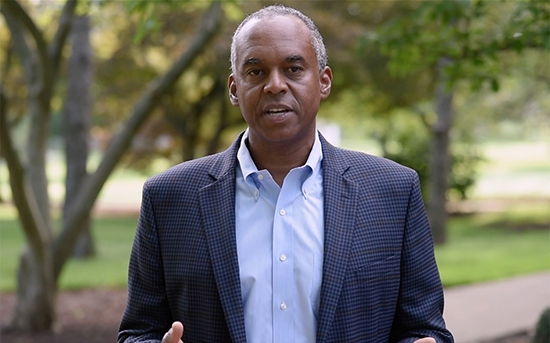Union formally opened its 226th academic year Tuesday with a virtual Convocation ceremony to welcome the Class of 2024, reflect on recent accomplishments and remind the community of the shared challenges ahead.
“As we begin this new academic year, we see both the fruits of our labor, and that the year ahead will require unparalleled commitment, flexibility, patience and goodwill,” said President David R. Harris. “It will require that we follow health and safety protocols at all times, not just for a few weeks or in some circumstances.”
He stood alone outside of Feigenbaum Hall instead of at a lectern in a packed Memorial Chapel where Convocation is typically held. Large gatherings are prohibited on campus during the global pandemic.
Harris repeated the familiar series of steps the campus community must follow to ensure the College avoid a shutdown similar to the one in March when COVID-19 erupted. This includes wearing masks, practicing social distancing, avoiding large gatherings and participating in regular testing.
“This will be the year in which we continue to identify what's most important to us and use our collective wisdom to find new ways to achieve it while keeping one another safe,” he said. “It will be the year that demands a novel, all-encompassing Union College challenge that none of us would have selected. We must become comfortable being uncomfortable. We must celebrate our victories, support one another when we stumble, and in the process, develop insights into one another and ourselves that will enable us to thrive as individuals and as a community, now and for many years to come.”
He stressed, however, that the goal for the year is not just to survive the myriad challenges COVID-19 presents.
“It is to achieve our shared vision in the time of COVID,” he said. “We must be a college that is deserving of the exceptional staff, students and faculty who have joined our community. We must achieve individually and collectively the goals established as part of our strategic planning process. We must remain motivated in the future by what motivated us in the months before COVID-19 dominated conversations in every part of the world.”
Harris noted the importance of continuing to ask fundamental questions about diversity, inclusion and equity. In June, he announced a new Presidential Initiative on Race, Power and Privilege. The initiative came in the wake of nationwide protests sparked by the death in May of George Floyd, an unarmed black man killed by a white police officer in Minneapolis.
“We must balance our love for Union and all it has enabled with a frank acknowledgment of the cultural ruts that have been worn into this campus over the more than 225 years in which our conception of inclusion was far narrower than what is required now and will be required in the future,” he said.
“We must understand how these ruts, in what is considered a typical Union experience, enable some to have relatively smooth and assured paths through Union, while others persevere despite a daily struggle for acceptance of their identities, their experiences, their perspectives-, and their centrality in Union's story. We must act with wisdom, empathy, courage and impatience to change Union, not so that it is unrecognizable, but so that it recognizes fully and equally the preferences, passions, and contributions of all who call this campus their home.”
While he focused on the coming year, Harris also touched on some of the highlights of the preceding year. This included the launch in February of a capital campaign with the largest gift in Union’s history, $51 million from Class of 1980 graduates Rich and Mary Templeton. The gift will transform engineering and the liberal arts with the creation of the Templeton Institute for Engineering and Computer Science.
In closing, Harris acknowledged an unprecedented year ahead, but said in the end, it will be filled with joy and real and lasting progress on personal and shared goals.
“And perhaps as an afterthought, we'll recall there was also the year we faced the challenges of COVID-19 and emerged with our integrity, our community and our aspirations intact,” he said.
Read the full text of Harris’s remarks.
Also during the 20-minute ceremony, the College marshal, Kathleen LoGiudice, professor and chair of the Biology Department, welcomed the 470 members of the Class of 2024. She also recognized the students who made the Dean’s List last year, and welcomed 95 employees who have joined the Union community in the last year.
LoGiudice noted that Scott Kirkton, associate professor of biology, winner of the Stillman Prize for Faculty Excellence in Teaching, and Leo Zaibert, professor of philosophy, winner of the Stillman Prize for Faculty Excellence in Research, would be presented with their awards later. The prizes, created by David I. Stillman ’72, Abbott Stillman ’69 and Allan Stillman in honor of their father and grandfather, Abraham Stillman, are normally presented at Convocation.
Amarilis Francis, associate director of the Academic Opportunity Program, winner of the UNITAS Community-Building Prize, will also be honored at a later date. The prize is given in recognition of a person who has helped foster community and diversity at Union.
Other speakers at Convocation included Mary K. Carroll, the Dwane W. Crichton Professor of Chemistry and chair of the Faculty Executive Committee; and Matt Toy ’21, Student Forum president.
